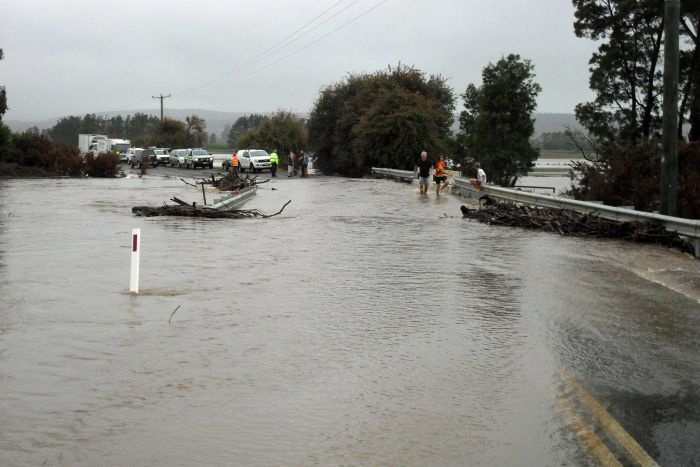While “higher” levels of government dither, local authorities are wrestling with climate change.

Local government must bear the brunt of damage from weather events. PHOTO ABC News
When you think about it, it’s breathtaking. The 2017 federal budget is seeking to close the books on Australia’s biggest economic, social and environmental issue of this or any century.
Buried deep in the budget papers is the revelation that two national climate agencies – the Climate Change Authority and the National Climate Change Adaptation Research Facility – are to be defunded before being wound up.
This, just as business is realising the challenge presented by our Paris policy commitments and the rising cost of a changing climate is driving insurers and local authorities to despair.
It’s not unexpected, and the government will say it doesn’t need those agencies because it can go elsewhere for expert help. It could, but past experience says it doesn’t care to. It closed its ears to climate advice long ago.
In his budget speech Scott Morrison said nothing of this, nor of climate change generally. He did mention, seemingly with pride, the billions already committed out of the government’s ineffectual, near-empty Emissions Reduction Fund. But without a wholesale work-over that too will go.
Contrast that miserable effort with rising local and regional concern in every state about existing and impending climate impacts on their lands and people.
“Higher” governments might turn a blind eye to these challenges, but local authorities are confronting them. Last week, the Local Government Association of Tasmania got together with Climate Tasmania, a non-government advisory group (of which I am a member), to bring local, state and national expertise together to look at climate change risks and discuss practical responses.
Some snippets of information from the day: Hobart climate scientist John Hunter described the separate challenges of mitigating and adapting, weighing the risk of climate impact, and the steps taken so far to understand what is ahead in Tasmania.
Brisbane climate change consultant Donovan Burton spoke of “cascading impacts” of climate change already happening, of the need to develop clear goals, to get good baseline data now, and to build good governance. Local reform – zero to hero – can happen quickly, with massive benefits.
Craig Plaisted gave a rundown of Meander Valley Council’s energy program involving embedded networks, solar panels with batteries, LED street lighting, retrofitted buildings for energy efficiency, electric vehicles and industrial-scale bioenergy.
Canberra climate policy officer Peta Olesen explained the ACT’s ambitious measures to achieve targets that put most other Australian jurisdictions to shame: 2020 goals of all-renewable electricity and emissions 40 per cent below the 1990 level, with net zero emissions before 2050.
Zero carbon emission targets are eminently attainable – “but you must invest to get there”, said Hobart climate policy specialist Philip Harrington, who has helped major Australian capital city councils develop strong targets. The successful cities, he says, consult their communities.
A team of Hobart City staff described our capital’s own considerable effort to get emissions down (over 70 per cent less since 2000) and encourage residents to do the same. Infrastructure planning manager Scott Morgan described the city’s large array of ingenious energy-saving measures.
Planning specialist Clive Attwater explained how electric cars, buses and trucks are set to transform our transport landscape, and Tristan Knowles described the many ways the Clean Energy Finance Corporation was helping communities add renewables to their energy mix.
Finally we had the view from “higher” government levels, including the Tasmanian Climate Change Office, a small, close-knit team of highly-committed public servants which since 2008 has punched well above its weight in leading Tasmania’s response to climate change.
A representative of the federal environment department gamely took us through the national climate change policy review, encouraging public submissions even after the closing date of 5 May.
As do I, despite the likelihood that the government, which is doing its best to vacate this space, will continue to turn its back on good climate policy ideas. The good news is, there are options.
